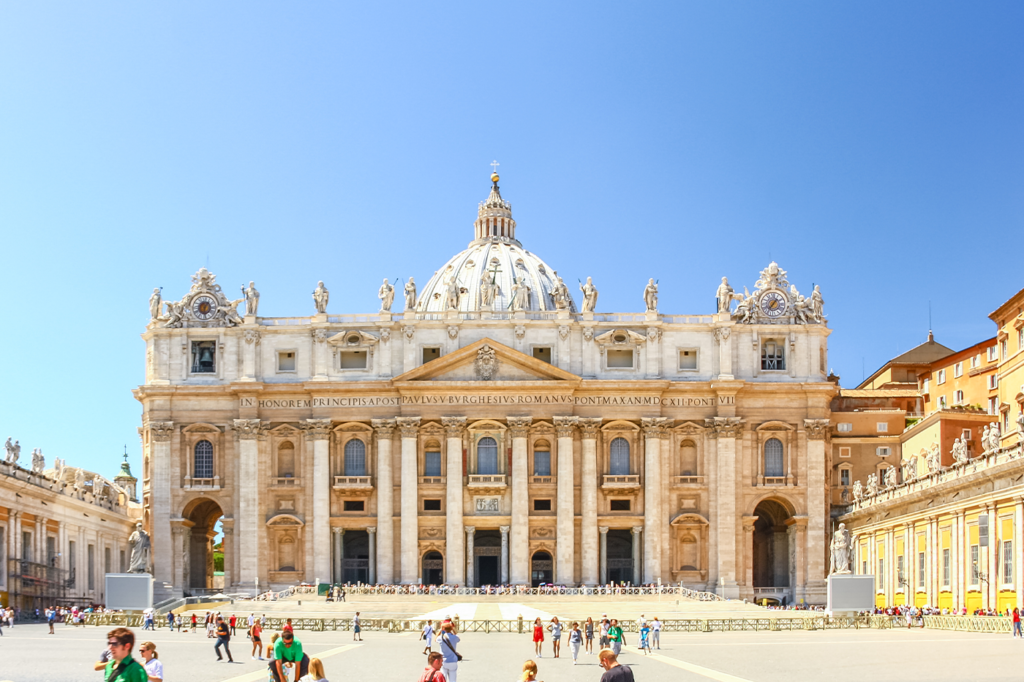George Weigel’s The Irony of Modern Catholic History is an outstanding, memorable textbook on the history of modern Catholic political thought. If it had been around in the days when I used to teach modern Catholic politics, many students would have learned it by heart for their exams. Weigel’s telling of the story is memorable because he gives it the shape of a five-act drama, and the movement from problem to peripeteia to climax makes it stick.
Act One sets out the “problem” in which the Church found herself in the early nineteenth century. The Church responded to modernity in the only way she knew how: by anathematizing it, most obstinately in Mirari Vos (1832)—which scornfully deprecated the notion of separation of church and state—and most notoriously in the Syllabus of Errors (1864). The Syllabus is the stuff of legend, but Google has made it all too easy to disprove the apocryphal tale that it pronounced a prescient execration upon the use of electric light bulbs. It stuck Catholic political thought with an apparently perpetual condemnation of the idea that “the Roman Pontiff can and should reconcile himself with progress, liberalism, and modern civilization,” which Weigel astutely terms “a blunderbuss formulation that seemed not so much boldly defiant of the nineteenth century’s form of political correctness as simply mindless.”
The problem, which sets the drama in motion, was threefold. Modern, secularizing politics was a critical challenge to Catholic political influence. The Church reacted with denunciations that could only render her politically irrelevant, and that thus amounted to a wall of words behind which to retreat. This made the Vatican seem a prisoner of its own willful or “mindless” impetuosity. Italian nationalists acted as good sons of their Catholic mothers and did the Church a great service when they stripped the Vatican of the Papal States, thereby destroying the idea of the spiritual necessity of temporal power. This good turn on the part of the secularists deserved another from their mother the Church, and would eventually be repaid.
The turning point, or peripeteia, begins with Pope Leo XIII’s attempts to engage with modern politics and society. In great, transformative encyclicals such as Rerum Novarum, the Thomist pope sought to undercut the attraction of collectivism by inventing a kind of “Aristotelian” middle way between the anarchism of the robber barons and the socialism of their employees. The rule of law without which no market economy can function takes its grounds from the natural moral law, Leo XIII taught, and he encouraged the development of a society in which most people are property owners, a dignity proper to them as individual persons.
Start your day with Public Discourse
Sign up and get our daily essays sent straight to your inbox.Rather than sound like he thought the defunct ancien régime was the only regime worth doing business with, as Leo’s predecessors had done, the Thomist pope taught that any regime that recognizes the natural, moral law is legitimate and should be respected. Though America was only dimly, and largely negatively, in the Victorian Pope’s sights, Michael Novak was surely right to see America as the best exemplification yet of what Rerum Novarum was after. But that insight was all too long in coming. Rerum Novarum, and Leo’s attempt to engage with political modernity in Thomist categories, soon became a fixed Catholic utopia, deployed as a measure by which to judge and find modernity wanting, not as a means through with to converse with actual realities and personalities.
The real turning point is Vatican II and its resolute conversion from the Catholic political project allied to the Counter-Reformation. This is Weigel’s “Act III,” and the center of his “drama.” Weigel explains that, thanks to the work of the Holy Spirit (Deo Gratias!) and John Courtney Murray, the Church, at the Second Vatican Council,
could reach back into its history and recover the distinction that Pope St. Gelasius I made between religious and civil authority—a distinction ultimately rooted in Matthew 22:21 and Christ’s distinction between what is owed to Caesar and what is owed to God. Thanks to the development of Catholic philosophical anthropology in the twentieth century, the bishops of Vatican II could reappropriate the ancient truth that one of their theological advisors, Joseph Ratzinger, would later express in a simple, luminous, formula: “God wishes to be adored by people who are free.” Thanks to the experience of a vibrant American Catholicism under a constitutional democracy, the fathers of the Council could disentangle themselves from the notion that a close alliance between altar and throne (or legislature) is essential to the Church’s mission. And thanks to its experience with twentieth century totalitarianism, the Church’s leadership could grasp the fact that religious freedom was essential for Catholicism’s institutional survival, and its affirmation was essential in challenging the claims of various forms of political modernity to omnicompetence.
Catholic Integralism as a main current of doctrine in the Church died at Vatican II with Dignitatis Humanae, the Declaration on Religious Freedom, and Weigel grasps and explains that here.
In a fourth step, once Catholic social and political thinking made its way inside modernity, it was able to criticize it, not from without but from within. Particularly in the thought and actions of Weigel’s hero, St. John Paul II, Catholicism was able to take on the modern anthropological turn and ask what actually speaks to the questions and mystery of the human subject. Taking on board the modern turn to the subject, it was able to propose that this questioning, and the infinite ambition—the infinite desire—it reflects, are only fully answered by Jesus Christ. In the triumphant fourth act, Catholic thinkers are unleashed by Dignitatis Humanae to argue that the modern Prometheus is but a shadow and a half-finished torso: the rounded actuality to which our space-age Prometheanism points is the New Adam, Jesus Christ. And they were able to do this at just the moment when it became apparent that modernity was groundless, and that law, justice, and truth have no foundation other than the God of Abraham, Isaac, and Jesus. The irony was, then, as Weigel would have it, that Catholicism embraced secular modernity only to find itself in the role of its sole liberator and savior.
Weigel’s five acts are intended neither as tragedy nor as comedy but as an “irony.” “Irony” is a style, not a genre, but Weigel does his level best to defeat that fact. That gives us one of those bleak, entertainment-free comedies beloved of high-minded public radio audiences, in which nothing was ever terribly funny to begin with and events turn out badly in the end. The great irony of the fifth act is that (to vary our cast of mythological heroes) the Catholic Atlas, who was supposed to be holding up the modern world, turned out to have very clay feet. At the moment of the potential triumph of Catholicism as a political worldview, with its unrivaled capacity to underwrite law and justice against postmodern nihilism, the Church was rocked by horrifying reports of clerical sexual abuse that her hierarchy had concealed and abetted for decades.
The Christian Prometheus was brought to its knees by organized sexual sin, concealed, and thus abetted, by high-ranking clerics. The whole dirty business stank with clericalism. The Church lost the moral authority with which to defend secular modernity in its love for free-spirited human beings, or persuasively to criticize secularist modernism in its potential for nihilism. The only power that rightly belongs to the Church is that of the moral witness, and, with the sexual abuse scandals, the Church could no longer convincingly play that role. The play ends, then, with the protagonist having lost not only her integralism but also her integrity, stripped of her role, and unable to tread the public boards—precisely the fate Gregory XVI and Pius XI feared. Weigel’s curtain comes down on a hero who is naked and ashamed.
Will the lead character ever find an author who can write a new script for a sequel? There is only one Author who can do that, and it is not George Weigel, or even John Courtney Murray. I think Weigel would have left us at less of a loss about how to go forward if he had been more open-minded in his reading of the current papacy, and seen Pope Francis as an ally of the political project that Weigel champions. The Leonine political project was always imperiled by clericalism. Right from the start, clericalism was the sin that kept undermining the effort to create a modern Catholic social and political teaching. The Church was the lens through which all Catholics implicitly understood any kind of politics, and the institutional, clerical Church operated top-down. No earthly government runs like the institutional church, nor should it. And yet proponents of Leonine politics displayed an ingrained propensity for centralized, despotic forms of government—that mimicked the Church’s own methods of delegating authority from the center, and that hurt and disenfranchised the poor.
Compare Weigel’s paeans to Leo’s encyclicals with what Catholic-influenced governments actually wrought, in twentieth-century Spain, South America, or Ireland. The lens or paradigm was the Church, as clerically conceived, with top-down authority. It didn’t apply to any realistic political order, let alone to liberal constitutional democracies. With Vatican II came a revision of the lens—one that Pope Francis has heartily encouraged—in which the charismatic side of the Church rightly balances the institutional, and in which the priesthood—and what Benedict XVI calls the “co-responsibility”—of the laity is properly acknowledged. Understanding the Church that little bit differently will perhaps help Catholics to understand politics better—beginning, with any luck, by dropping the useless conception of subsidiarity as power delegated from some omniscient central command.
Pope Francis’s theology of the people gives us a new ecclesial lens and paradigm through which to understand earthly politics, in which people take the initiative. Their consciences are informed by their bishops, but they act on their own initiative. No one finds a spouse, marries, and creates a little “domestic church” after having been told to do so by their bishop. And they don’t need any encouragement from government either. Integralism died at Vatican II, but it took the clerical abuse scandal to take out the central-command concept of Catholic ecclesiology. Like the loss of temporal power, this may well do Catholics a service in the long run, freeing us up to a better, more “ground-up” conception of how societies and their economies work.













